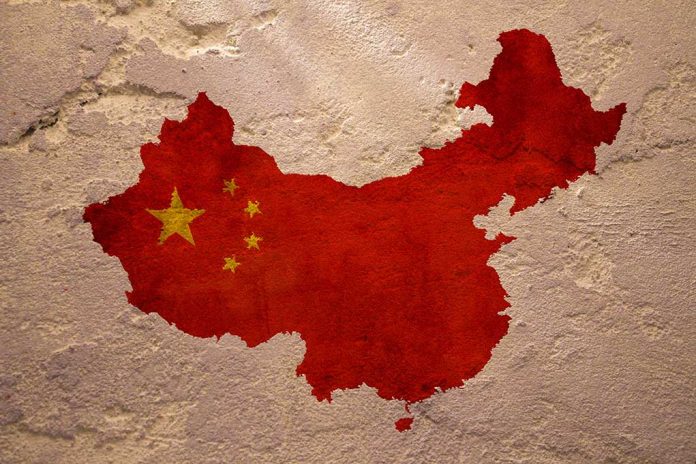
Communist China launches a devastating new ban on Christian missionaries, forcing all religious activities under strict government surveillance as part of its most aggressive crackdown yet on religious freedom.
At a Glance
- China has implemented new regulations, effective May 1, prohibiting all foreign missionary activities without explicit government approval
- Foreigners are banned from preaching, sharing faith, or forming religious organizations with Chinese citizens under any circumstances
- All Christian activities must occur within state-monitored churches that promote loyalty to the Communist Party above religious teachings
- The Chinese government has intensified persecution, using advanced surveillance technology to track and arrest members of independent house churches
- Despite severe persecution, Christianity continues to grow in China with estimates of 80-100 million believers nationwide
China’s Total Ban on Christian Missionaries
China’s Communist Party has implemented its most comprehensive restrictions yet on religious freedom, with new regulations that will effectively eliminate all Christian missionary work in the country. The rules, set to take effect on May 1, explicitly forbid foreign nationals from establishing religious organizations, preaching without authorization, founding religious schools, producing religious books, or recruiting Chinese citizens as followers. These sweeping prohibitions represent a dramatic escalation in the Communist Party’s ongoing campaign to bring all religious expression under direct state control.
The regulations, published by China’s National Religious Affairs Administration, consist of 38 articles severely restricting foreigners’ ability to organize any religious activities. Under the new rules, collective religious gatherings organized by foreigners are strictly limited to foreign participants only, with almost no exceptions. Any foreigner wishing to preach must receive an invitation from state-run religious organizations and obtain explicit approval from the United Front’s religious affairs administration – with all content scrutinized to ensure it “does not interfere with China’s religious affairs.”
State Control Over All Churches
The Communist Party’s strategy for controlling Christianity involves funneling all religious practice through state-managed institutions that promote party loyalty above religious devotion. Only five religions are officially tolerated in China – Buddhism, Taoism, Islam, Catholicism and Protestantism – and even these must operate under government organizations that ensure communist ideology takes precedence over spiritual teachings. For Christians, this means worshipping exclusively in the state-approved Three-Self Church or Chinese Catholic Patriotic Association, where sermons are monitored and political indoctrination is incorporated into religious teaching.
“They have worked to curb the growth and spread of cult organizations, mitigating potential threats to national political security and maintaining social stability,” reported the state-run Global Times
The Chinese government justifies these restrictions as necessary to protect “normal religious activities” and maintain national security. In government propaganda, independent religious groups are routinely labeled as “extremist” or “cultish” organizations that threaten social stability. According to official statements from China’s Ministry of Public Security, authorities “intensified efforts to dismantle cult organizations in 2024,” increasing spending on technology and manpower specifically to target unsanctioned religious gatherings. This crackdown represents the Communist Party’s fundamental hostility toward any organization that might command loyalty above the state itself.
High-Tech Persecution of Independent Churches
China’s war on independent Christianity relies heavily on the country’s sophisticated surveillance apparatus. The government has deployed facial recognition cameras, social media monitoring, and a comprehensive social credit system specifically designed to identify and punish citizens who participate in unsanctioned religious activities. House churches – independent congregations that refuse to register with the state – face routine raids, with pastors and members arrested for endangering state security. The surveillance system tracks various aspects of citizens’ lives, from financial transactions to social associations, creating a comprehensive profile used to control those deemed threats to the Communist regime.
The new missionary ban represents a significant escalation in China’s religious persecution, currently ranked 15th on the 2025 World Watch List for severe Christian persecution. The regulations effectively criminalize any form of religious outreach by foreigners, cutting off a vital channel for spiritual support and connection between Chinese Christians and the global church. For missionaries currently operating in China, often under business or education visas, the new rules create an impossible situation where even private religious conversations could trigger deportation or more severe consequences for their Chinese contacts.
Christianity Grows Despite Persecution
Despite decades of persecution, Christianity has experienced remarkable growth in China, expanding from an estimated 4 million believers in 1949 to between 80 and 100 million today. This growth has occurred largely through indigenous evangelism rather than foreign missionary work, with Chinese house church networks developing sophisticated underground structures to evade government detection. The Communist Party’s renewed focus on eliminating missionary activity reflects its growing concern about Christianity’s continued expansion despite previous crackdowns and restrictions. For many Chinese Christians, the intensifying persecution simply confirms their faith’s power and authenticity.
“China’s public security authorities are intent on rooting out every pocket of independent religious thought,” the CCP stated.
The missionary ban highlights the Communist Party’s fundamental insecurity about ideologies that challenge its monopoly on truth. Under President Xi Jinping, the government has implemented increasingly restrictive policies against all religions, viewing independent faith communities as threats to its authority. For Christian missionaries who have dedicated years to building relationships in China, the new regulations represent a devastating setback, forcing many to leave the country and abandon their ministries. However, history suggests that persecution often strengthens rather than weakens religious movements, potentially accelerating the underground growth of Christianity in China despite the government’s best efforts to control it.






















